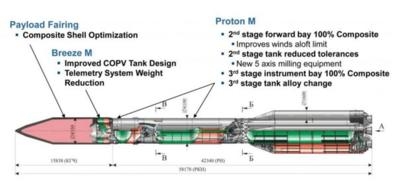Wed, Feb 17, 2016
Engineers Proceeding With LV Stages In Preparation For Launch
The Proton-M launch vehicle earmarked for the Russian-European ExoMars-2016 mission has been delivered to Baikonur. The Proton-M will orbit the scientific equipment including the Schiaparelli entry, descent and landing demonstrator module (”Schiaparelli”), and the Trace Gas Orbiter module.

To inject the scientific equipment in the target orbit, the Proton-M ILV will use the Breeze-M upper stage. The launch of the mission spacecraft is scheduled for 14 March 2016.
The train carrying the launcher stages was transferred to the Integration & Testing Facility in Area 92?-50 last week. There, Roscosmos and Khrunichev specialists will proceed with the mating of the LV stages and preparations for the launch.
The heavy-lift Proton and the Breeze-M upper stage were designed and are serially manufactured by the Khrunichev Space Center. The system is used to insert payloads to low-earth orbits and escape trajectories on missions under the federal and commercial programs. The system is marked for its high performance characteristics. Outfitted with the Breeze-M Upper Stage, the modernized Proton-M is capable of providing a geo-transfer injection for payloads with a mass in excess of 6MT.
ExoMars is a joint project of the Roscosmos State Corporation and the European Space Agency (ESA). The Trace Gas Orbiter will study small quantities of gas impurities in the atmosphere and distribution of water ice in the soil of Mars using also Russian scientific equipment designed at the Institute for Space Research of the Russian Academy of Sciences. The orbital module will also retransmit data from the descent demonstrator module of the 2016 mission, and from the descent module and Mars rover vehicle of the 2018 mission.
The Schiaparelli landing demonstrator is intended for verifying viability of procedures required for entering the atmosphere, descending, landing, and carrying out research using onboard scientific equipment.
(Source: International Launch Service news release. Image provided by ILS)
More News
Homing [ICAO] The procedure of using the direction-finding equipment of one radio station with the emission of another radio station, where at least one of the stations is mobile, >[...]
Aero Linx: European Regions Airline Association (ERA) The European Regions Airline Association (ERA) represents a diverse membership of over 50 airlines and more than 150 associate>[...]
A Few Questions AND Answers To Help You Get MORE Out of ANN! 1) I forgot my password. How do I find it? 1) Easy... click here and give us your e-mail address--we'll send it to you >[...]
While On Short Final, About 300 Ft, The Pilot Performed A Forced Landing Near Trees On September 7, 2025, about 0932 eastern daylight time, a CubCrafters Carbon Cub EX airplane, N4>[...]
Severe Icing The rate of ice accumulation is such that ice protection systems fail to remove the accumulation of ice and ice accumulates in locations not normally prone to icing, s>[...]
 ANN's Daily Aero-Term (10.13.25): Homing [ICAO]
ANN's Daily Aero-Term (10.13.25): Homing [ICAO] ANN's Daily Aero-Linx (10.13.25)
ANN's Daily Aero-Linx (10.13.25) ANN FAQ: Q&A 101
ANN FAQ: Q&A 101 NTSB Prelim: CubCrafters Carbon Cub
NTSB Prelim: CubCrafters Carbon Cub ANN's Daily Aero-Term (10.14.25): Severe Icing
ANN's Daily Aero-Term (10.14.25): Severe Icing



